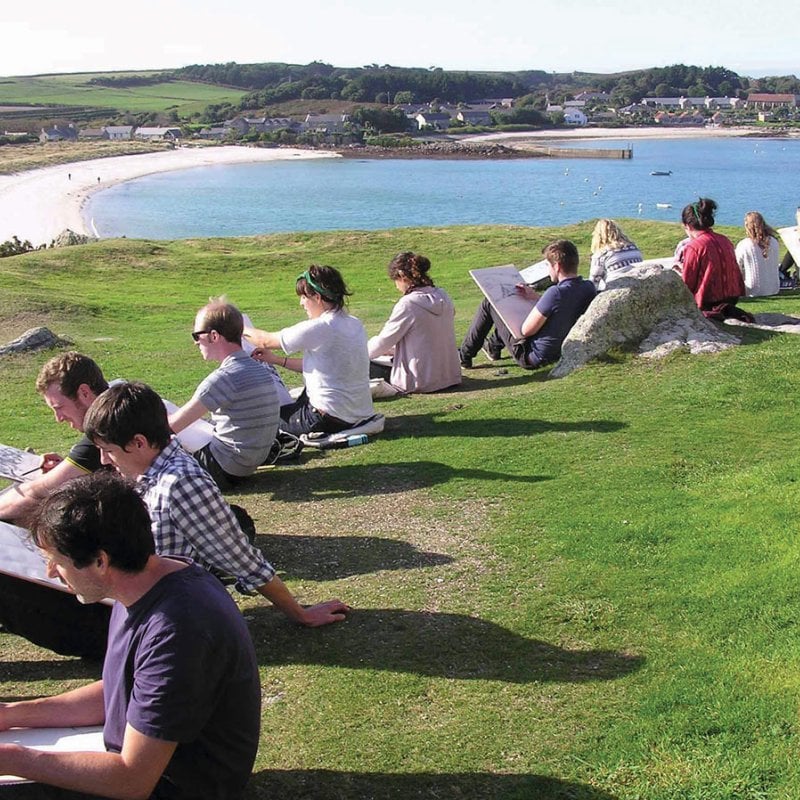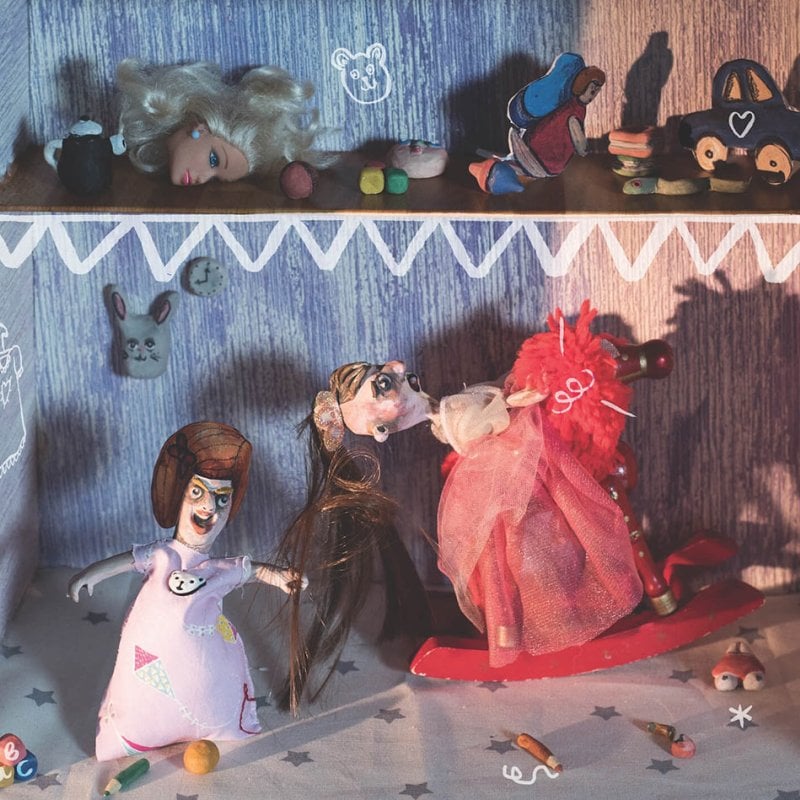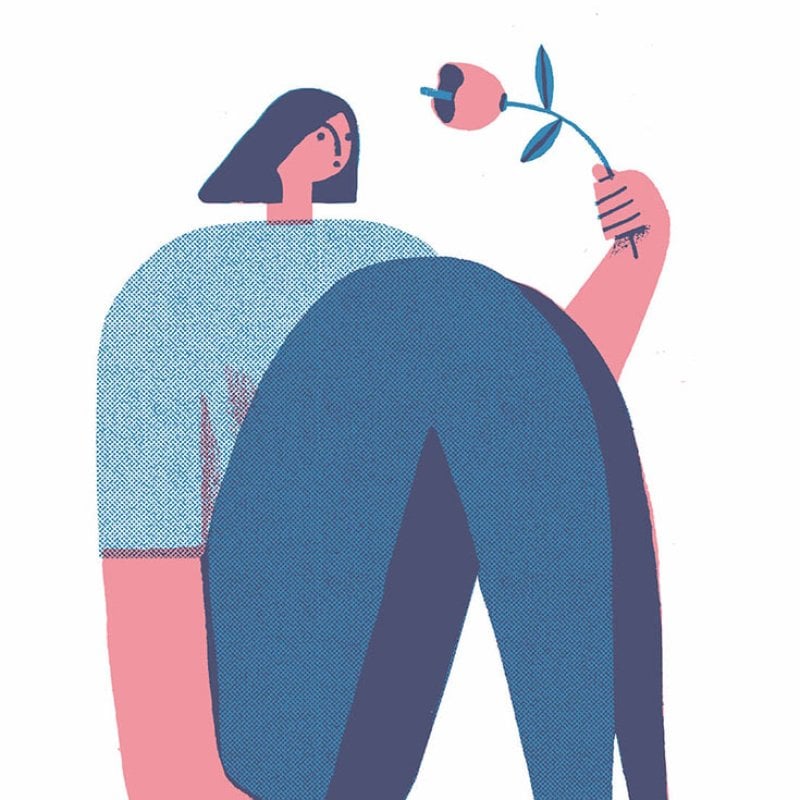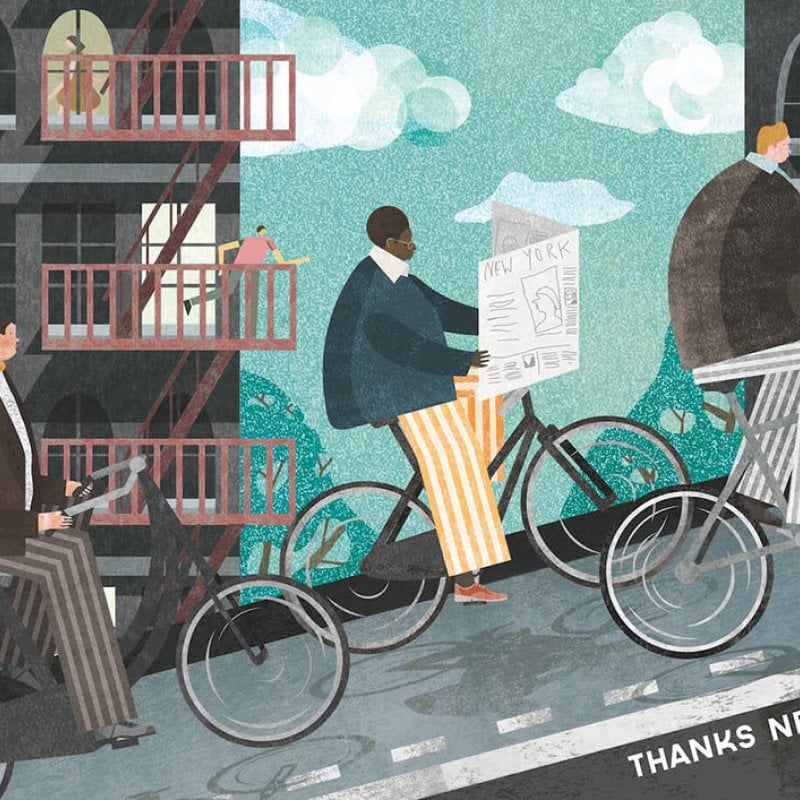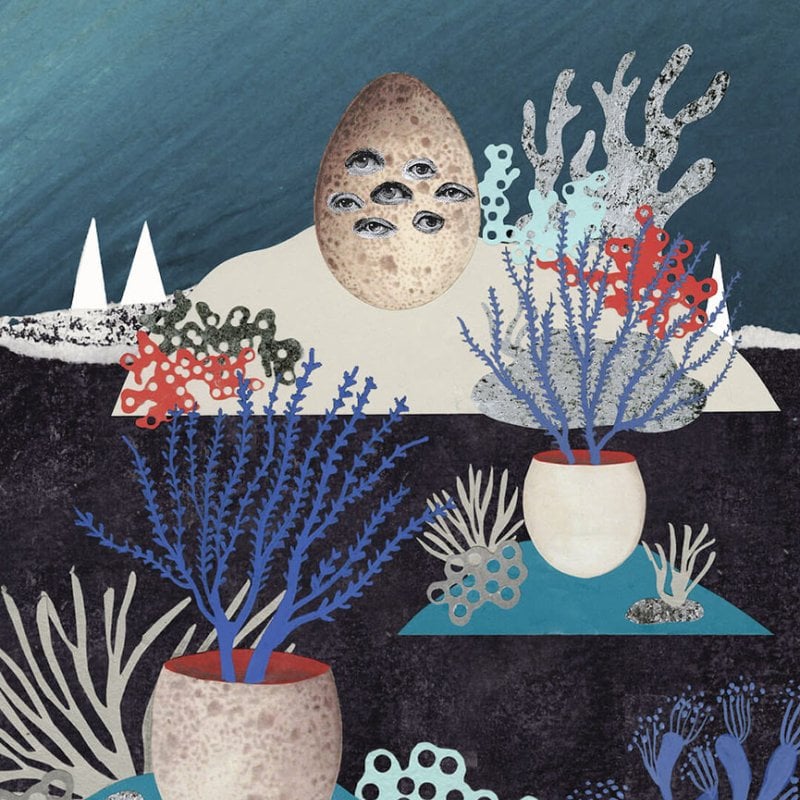
Illustration BA(Hons)
Follow in the footsteps of award-winning alumni on this renowned Illustration degree.
Course overview
Illustration is a powerful means of expressing ideas, eliciting emotion and sparking imagination. By enhancing your traditional craft skills and experimenting with new technologies, tools and techniques, you’ll develop your own unique visual language as you master the art of making images come to life.
On this Illustration degree, you’ll become an original, critical thinker, and adept visual problem solver. Through interactions with clients, art directors and designers, you’ll gain the skills needed to create a standout illustration portfolio and the professional experience required to succeed in your career.
You will:
- Be part of a thriving and immersive studio culture that embraces innovation, champions risk-taking and encourages creative collaboration
- Create your own digital portfolio and marketing campaign using digital platforms to reach global audiences
- Get your work seen by art directors, editors and designers around the world by engaging with a range of professional platforms
- Attend guest lectures from alumni and industry leaders that have previously included Dave McKean, Owen Davey, Harriett Lee Merrion and Edel Rodriguez
- Learn vital professional practice skills by working on engaging industry briefs
- Participate in our industry feedback week, gaining personalised portfolio feedback from agencies, publishers and design houses
- Explore illustration as a tool for positive change, in response to environmental, ethical and moral challenges
Course details
On this Illustration degree, you'll have the opportunity to gain a BA(Hons) degree over three years or study Illustration BA(Hons) with an Integrated Foundation Year and/or professional placement.
During your Illustration course, you’ll develop an authentic visual language by experimenting with a broad range of media and processes, as well as established and emerging technologies. You’ll learn to communicate conceptually using visual problem-solving strategies and techniques combined with ongoing reflective analysis and research.
You’ll also build strong project management and collaboration skills, learning to translate briefs and see a project through from ideation to research and development to final output. Further industry insights and experience will be gained through our programme of internationally renowned guest speakers.
In the first year of your Illustration degree, you’ll be supported to explore, question and disrupt new processes and practices. Through project briefs, workshops, collaborative projects, lectures and presentations, you’ll be introduced to a range of creative processes: from critical thinking to practical hands-on skills across different mediums. You also begin to engage with a wider industry context, connecting with art directors, publishers, designers, advertising agencies, illustration agencies and freelance illustrators.
Modules
Visual Problem Solving
You’ll explore a broad range of visual problem-solving strategies and develop analytical and project management skills through a series of practical projects and contextual lectures.
Practice & Purpose
Through a set of project briefs, you’ll investigate how illustration operates within the industry and how it communicates with audiences. You’ll also be encouraged to develop an informed practice, considering ethical and inclusive ideas.
Media & Methods
You’ll continue to develop a creative, imaginative and personal approach to your work while gaining awareness of the roles of media, mark making and process within industry.
Context & Audience
In this module, you’ll focus on the contexts of narrative illustration and deepen your understanding of how to communicate inclusively to a range of audiences.
Exciting briefs, workshops, lectures and presentations will introduce you to in-depth learning that includes a growing awareness of audience, refining practical skills, critical research, project management, history and theory and collaborative practice. Working both independently and in groups, you’ll also embrace challenging subjects and explore the environment around us to investigate how illustration can be used to inform and implement change.
As you progress through this stage of the Illustration degree, you’ll begin to develop your own self-initiated projects as well as a range of collaborations. As more industry facing experiences begin to be introduced through live briefs and lectures, you’ll be challenged to question convention, disrupt, innovate and maintain risk and courageous thinking throughout.
Modules
Refine & Apply
You'll experiment with a range of established and emerging technologies and undertake reflective and analytical research to refine your visual language.
You’ll also build on your visual communication skills through a broad range of illustrative contexts, platforms and applications.
Challenging Subjects
You’ll explore illustration as a vehicle for communicating change and developing tools for improving equality, diversity, inclusivity and sustainability.
Introduce & Negotiate
In this module, you’ll begin to develop your first independent negotiated practice project, through which you’ll relate to key contexts in contemporary illustration practice to enable you to test both conceptual and visual language skills gained in the early phase of the course. The diagnostic nature of the module will enable you to make decisions about the future direction that your work takes.
Collaboration
This module focuses on a range of collaboration skills, allowing you to develop and utilise them through working as part of a collaborative team both outside and inside your disciplinary studies.
You can choose to take an optional professional placement after your second year on a three-year programme, or after your third year if you’re studying for a degree with an Integrated Foundation Year.
You’ll be responsible for finding your own placement, with support from the Employability team.
Choosing this option will enhance your industry experience and skills while studying.
How you’ll study during your placement year
You’ll spend time working in a professional context, as part of a business or organisation. This can be in one role, or up to three, and must be for a minimum of 24 weeks.
You’ll develop in-demand workplace skills, deepen your insight into industry and grow your network of contacts, all of which could help you get ahead in your career after graduation.
Throughout this year, you’ll develop a portfolio of work that includes critical self-reflection on what has been learned from the experience. You’ll be required to evidence your experiences, the skills you’ve learned and your professional growth.
The final year allows you to refine your approach and to test and challenge your emerging fields of interest, culminating in a final digital portfolio of work and an industry feedback contextual report.
The modules are designed to help you define your creative future beyond the Illustration course. You’ll continue to build core skills while reflecting critically on your strengths and exploring alternative models of practice.
Modules
Define & Realise
Through ongoing visual and intellectual experimentation and a process of critical analysis, you’ll work towards the development of an authentic visual language.
Research & Extend
You’ll engage with an extended programme of independent research on a subject that supports your illustration practice. You’ll then produce a written report.
Connect & Transition
In this module, you’ll develop your Final Major Project. This is an independent body of work, utilising appropriate processes defined by your strengths and interests within the field of illustration.
You’ll demonstrate your intellectual, technical and self-reflective skills while showcasing an emerging authentic visual language that connects and communicates with industry.
Professional Practice
This module is designed to equip you with the necessary skills to operate within your chosen career path. You’ll gain insights into the breadth of the creative industries and a deeper knowledge of professional practice.
Why study an Integrated Foundation Year route?
If you’re taking on a new subject that you haven’t studied in depth before, have been out of education for a while or have a non-standard educational background then an Integrated Foundation Year degree may be the right choice for you. It is a four-year degree with an Integrated Foundation Year to start, which allows you to explore the primary elements of your subject before progressing on to the remaining three years of the BA(Hons) degree.
What you'll study in your Foundation year
If you choose this pathway, you'll study five core modules in your Foundation year. These are all designed to help you explore the foundational elements of your subject. You'll gain relevant technical skills, learn to experiment and take risks, develop an understanding of professional practice, have opportunities to work across disciplines and collaborate with other students on live project briefs.
Modules
Explore
You'll begin your foundation year by working collaboratively with others to explore themes of the future. You'll take risks, experiment through play and be supported to break through barriers.
Technique
You'll take subject-specific workshops and develop essential technical and practical skills in your area of study. You'll also enhance your analytical and organisational abilities.
Apply
You'll work with your peer group to think beyond discipline by addressing a societal or global issue. You'll then showcase your work to your peers and deliver and accompanying evaluation of your process.
Industry
You'll enhance your creative and practical skills in your subject specialism by responding to typical industry briefs, underpinned by focused research and experiments. You'll also gain industry insights through guest lectures and workshops.
Launch
You'll develop your unique identity in your specialism through the production of a self-initiated body of work. Your final project will be the bridge to your next year, fully supported by evaluative reviews and critical analysis of the work you have created.
After the Foundation year, you progress into Year One of the full three-year degree, equipped with a deeper knowledge of your subject, a clear understanding of your strengths, and develop a practical and technical skillset and the confidence to excel in your chosen subject.
If you apply for and enrol onto a degree with an Integrated Foundation Year, you’ll have the option to switch onto a five-year version including a placement year. That means you’ll complete the first three years of your course before completing a placement in industry in your fourth year and returning to Falmouth for the fifth year of your programme.
The Integrated Foundation Year pathway for this course is subject to validation.
As part of our process of continuous improvement, we routinely review course content to ensure that all our students benefit from a high-quality and rewarding academic experience. As such, there may be some changes made to your course which are not immediately reflected in the content displayed on our website. Any students affected will be informed of any changes made directly.
From module information to course aims and assessment criteria, discover the full course details:
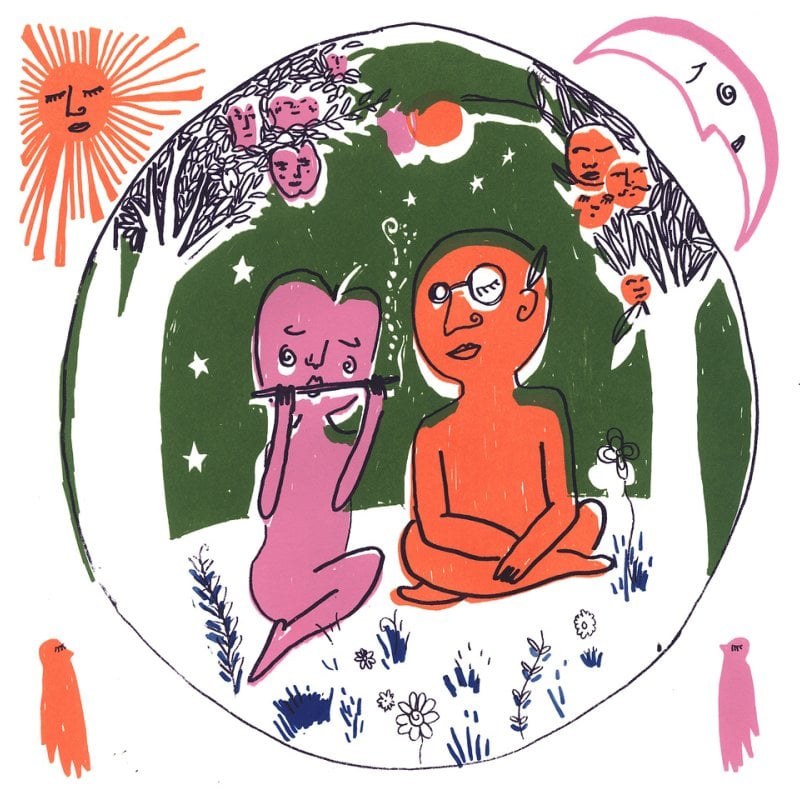
Student work by: Betty Everett
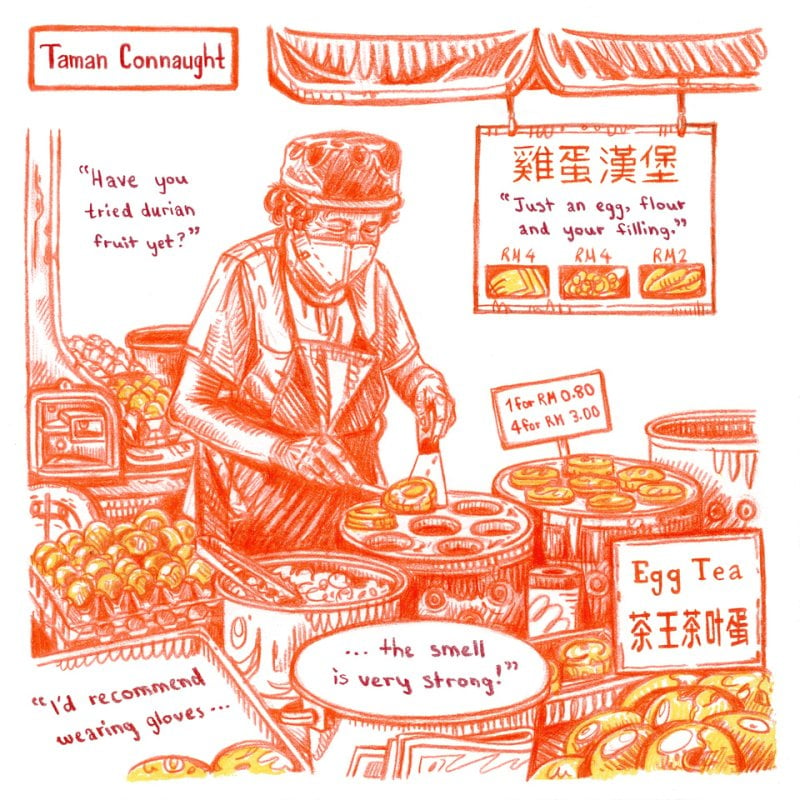
Student work by: Alice Mawdsley
How you’ll learn & be assessed
This Illustration degree balances creativity with professional practice. You'll gain hands-on knowledge and experience through project work, live briefs and client meetings. Supporting this will be lectures, seminars, group crits, workshops, one-to-one tutorials and optional placements or industry visits.
Our visiting speaker series has seen our students learn from Dave McKean, Noma Bar, Laura Carlin, Sam Arthur(Nobrow), Sue Coe, Paul Slater, Sara Fanelli, Russell Cobb, Graham Rawle, Matthew Richardson, Posy Simmonds, Jason Ford, Kai & Sunny, Owen Davey, Harriet Lee Merrion, Vivian Schwarz, Olivier Kugler and John Vernon Lord.
At Falmouth, we use a 'digitally enhanced learning & teaching' approach. Your experience will always be predominantly in-person, including seminars, tutorials and studio teaching, with some, more targeted elements, being online either live (synchronous) or pre-recorded (asynchronous). You can read more here.
100% of your assessment will be coursework.
Assessment methods
Assessment will take place at the end of each semester, and you'll get feedback and evaluation throughout the year. You'll be assessed through visual, verbal and written assignments, including your portfolio, as well as a research proposal.
If you choose the Integrated Foundation Year pathway for this course, all assessments within your foundation year will be 100% coursework based.
Facilities
- Dedicated open plan studios and seminar rooms
- Printmaking workshop
- Life drawing studio
- Range of IT facilities with full software and printing facilities
- Access to over 140,000 books, comprehensive electronic journal resource and DVD library featuring over 17,000 titles
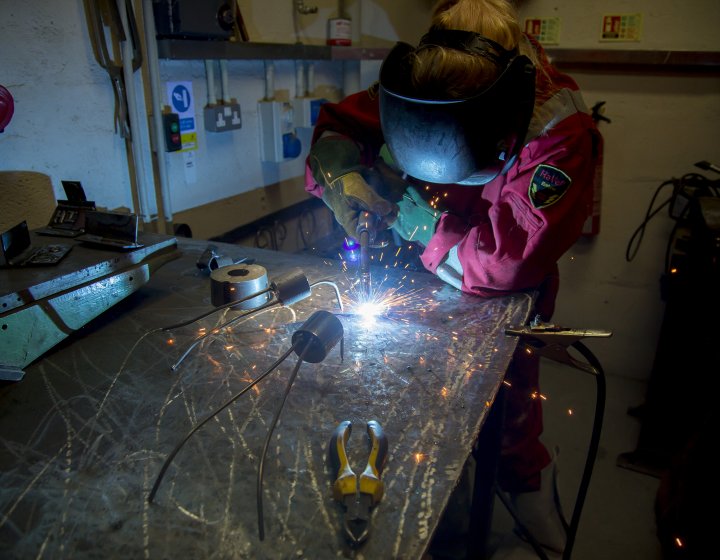
Art & Design Facilities
Primarily located at the Falmouth Campus in a subtropical garden, our studios and workshop facilitie...
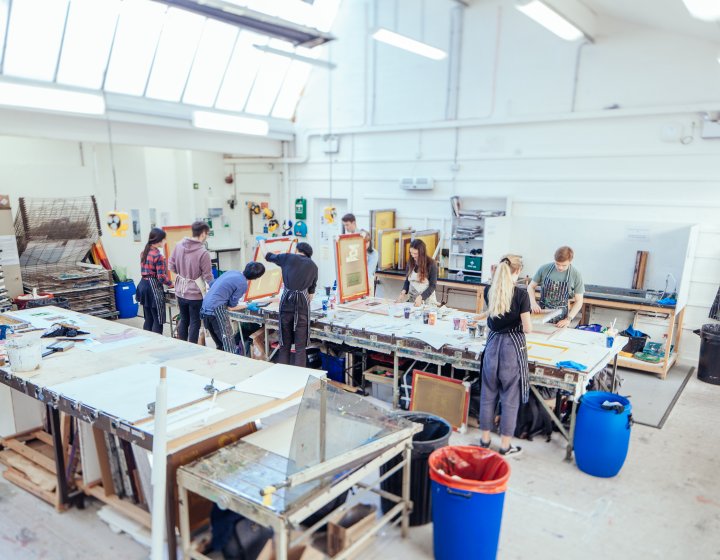
Printmaking Facilities
We facilitate a range of printmaking techniques and encourage both traditional and non-traditional p...
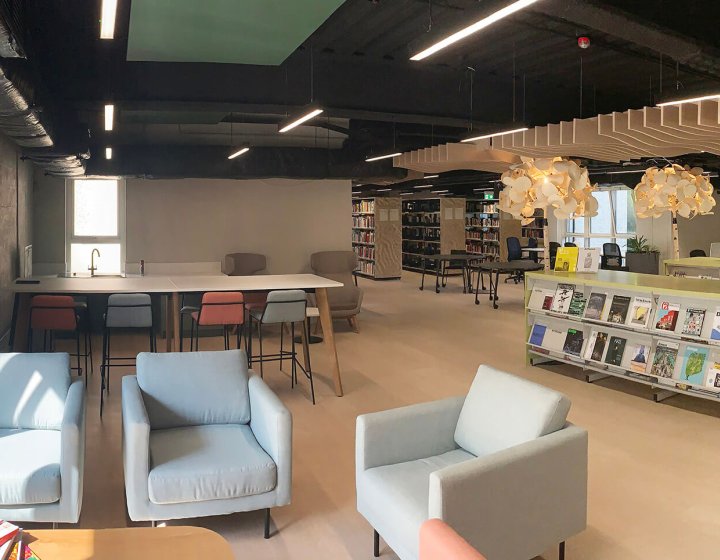
Library Facilities
Offering extensive collections, our two libraries provide a wealth of digital resources, magazines, ...

Sports Centre
Our Sports Centre, on Penryn Campus, includes a spacious gym with up to 90 of the latest, new statio...
Staff
Our teaching staff are practising illustrators with experience working for the likes of the Wall Street Journal, the Lancet Medical Journal, United Airlines and Varoom. They’re often key in helping our students find industry connections and opportunities.
Some members of staff only teach on specific modules, and your course might not feature every staff member who teaches on the course.

Nicholas Mott
Senior Lecturer
Nick Mott is an illustrator, artist and musician; being a co-founder of the underground, experimenta...

Nigel Owen
Course Leader, Illustration BA(Hons)
Having performed the roles of both Head of Illustration and also Course Leader since 2011, I decid...

Sue Clarke
Senior Lecturer, Illustration
Sue Clarke has been an academic and illustrator for over 30 years; she graduated from Central Saint ...

Tilly McKerrow
Senior Lecturer
Tilly is an Illustrator and art and design educator with over 10 years of experience teaching in FE ...

Hugh Frost
Course Leader, MA Illustration: Authorial Practice
Hugh is the Course leader for MA Illustration Authorial Practice at Falmouth. He is also an Editor /...

Linda Scott
Senior Lecturer
Linda joined Falmouth University in 2004, relocating from London where she worked as a freelance Ill...

Dr Carolyn Shapiro
Associate Professor of Visual Culture
Carolyn Shapiro has been teaching at the Falmouth College of Art, University College Falmouth, and F...

Christopher Odgers
Lecturer, Illustration BA(Hons)
After graduating from Falmouth University in 1999, Chris Odgers has gained over 20 years experience ...

Julie Ann Monks
Lecturer
Since graduating from Kingston University in 1996, Julie worked as a freelance illustrator based in ...

Georgie Bennett
Senior Lecturer, Illustration BA(Hons)
Georgie Bennett is a freelance illustrator, workshop facilitator, and lecturer. Clients include The ...

Graham Black
Lecturer
Graham graduated from Brighton Polytechnic with a BA(Hons) degree in Graphic Design and Illustration...

Maria Christoforidou
Lecturer
Maria Christoforidou is an artist, writer and researcher. Maria was born in Zambia, grew up in Greec...

Cally Gibson
Senior Technician
Cally Gibson works at Falmouth University as a senior technician, solving software queries and teac...

Emilia Wharfe
Senior Technician
Emilia Wharfe is a Senior Technician in digital skills for predominantly BA(Hons)/MA Illustration, h...

Emma Lewis
Associate Lecturer, Illustration BA(Hons)
Emma Lewis is an illustrator and writer from London, and creates work spanning both narrative and co...

Laurence North
Senior Lecturer
I joined Falmouth University in 1991, I have taught across a number of courses including Art and Des...

Elisa Cunningham
Lecturer, Illustration BA(Hons)
Elisa Cunningham is a freelance illustrator and lecturer. I have been commissioned in the areas of p...

Pete Williams
Module Tutor
Pete (Murgatroyd) Williams is a multi-media illustrator. His work has been commissioned by variou...
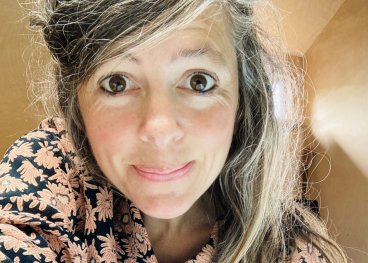
Rose Forshall
Lecturer, Illustration BA(Hons)
Rose Forshall is an illustrator, printmaker and lecturer teaching on the BA (Hons) illustration. She...

Dr Jeanie Sinclair
Lecturer, Illustration BA(Hons)
Jeanie joined Falmouth University as a lecturer in Critical Studies for Illustration in 2023. Her r...

Got a question about this course?
If you want to know more about the course structure, our application requirements or what our graduates have gone on to achieve, our friendly course team is here to help.
Chat to NigelStories from our community
Explore student projects, graduate successes, staff news and industry insights
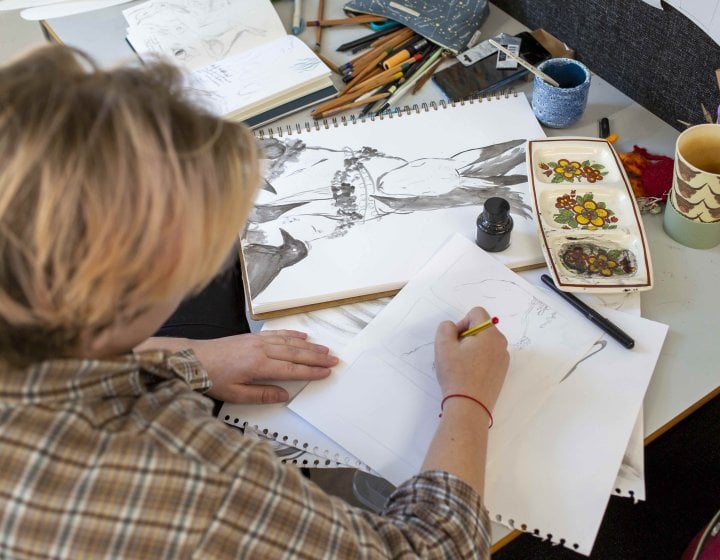
Work by Noah Frear
Why I chose to study Illustration at Falmouth
18 December 2023
So, you’re thinking about where to go to university for Illustration, it’s a popular course at a...
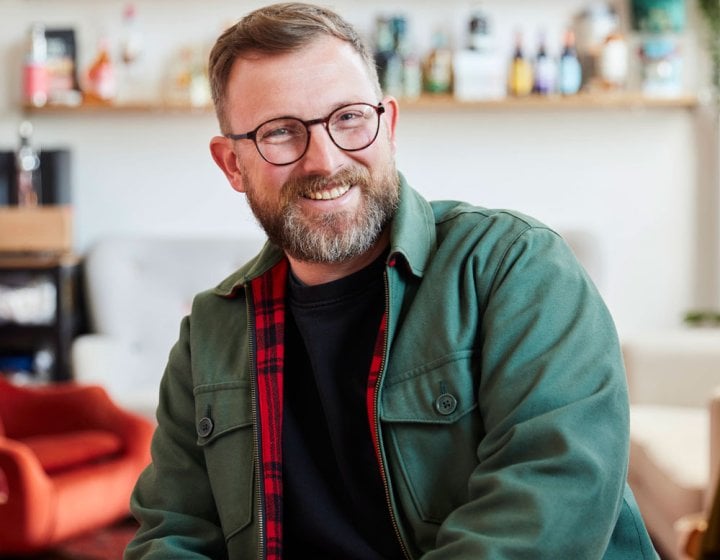
Illustration graduate receives global recognition for design agency Kingdom & Sparrow
11 February 2025
Falmouth illustration graduate, Johnny Paton, is celebrating the success of his design agency, Kingd...

Illustration graduate receives global recognition for design agency Kingdom & Sparrow
11 February 2025
Falmouth illustration graduate, Johnny Paton, is celebrating the success of his design agency, Kingd...
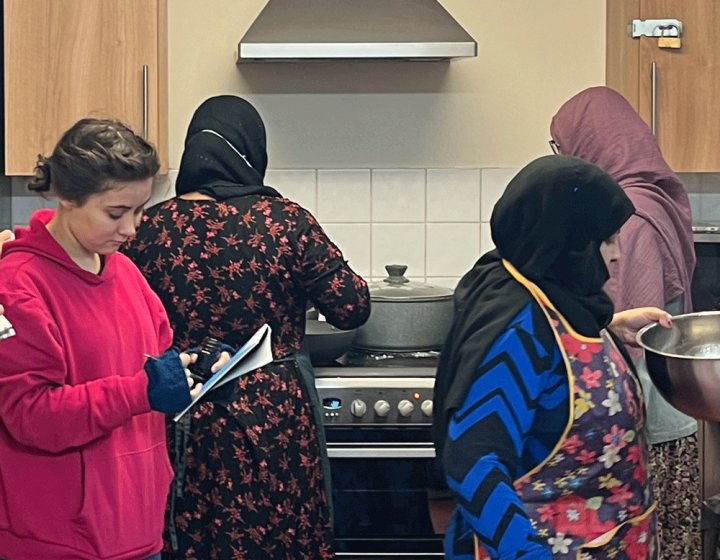
Second year Illustration students visit Tower Hamlets in London
17 January 2025
Five second year Illustration students travelled to London last month to meet Elaine, Sajna, and Sh...

Second year Illustration students visit Tower Hamlets in London
17 January 2025
Five second year Illustration students travelled to London last month to meet Elaine, Sajna, and Sh...

Louise outside The Fish Factory in Penryn. Photo: The Fish Factory
Graduate Spotlight: illustrator and entrepreneur Louise Lane
05 November 2024
For Louise Lane, there is nothing more important than community. Since moving to Falmouth to study I...

Falmouth Graduate Illustrates Stunning Children's Encyclopaedia, Amazing Asia
18 October 2024
Illustration BA graduate Jason Lyon has co-produced a beautifully crafted children’s encyclopaedia...
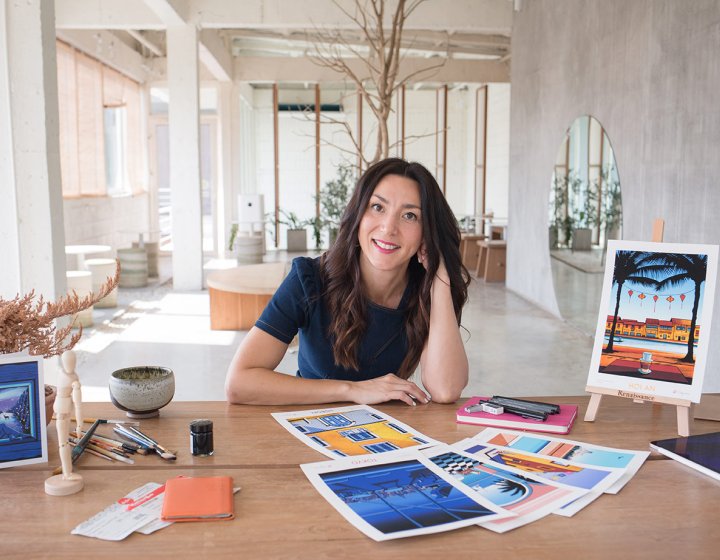
Graduate Spotlight: illustrator and digital nomad Molly Maine
26 September 2024
Meet Molly Maine, a BA Illustration graduate whose time studying at Falmouth and taking part in a St...
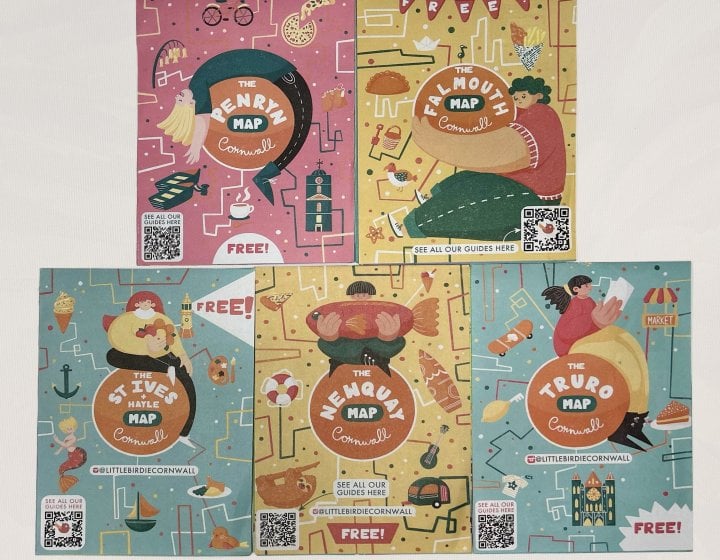
Chantelle's five designs in print
Online Illustration student creates Cornish town map covers for Little Birdie Guides
23 August 2024
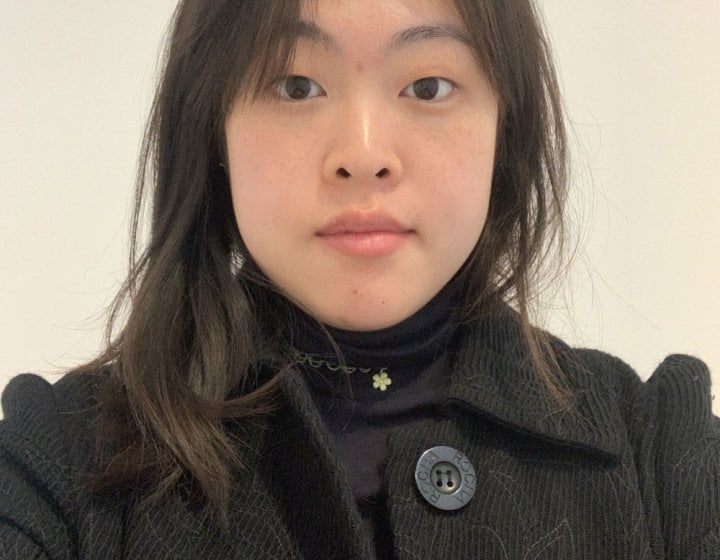
Illustration: Authorial Practice MA student selected for New Contemporaries
05 August 2024
Master’s student Dageong Han has been selected as a featured artist in a renowned organisation tha...
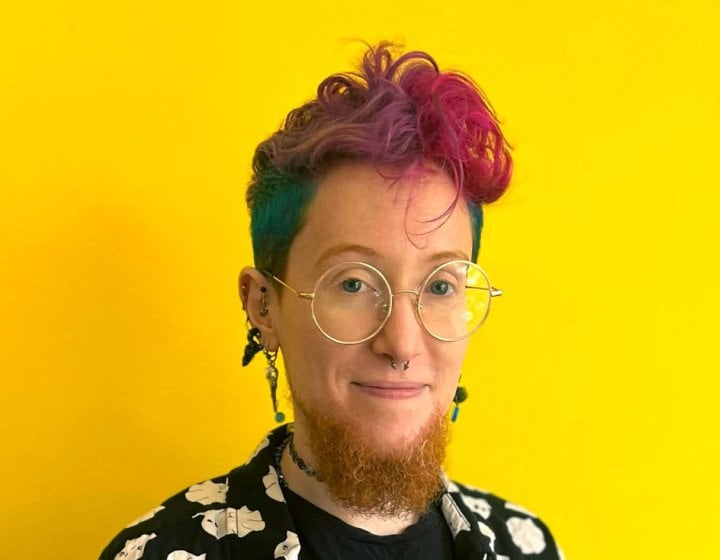
Graduate Spotlight: author-illustrator Dante Gabriel Hookey
17 July 2024
For Dante Gabriel Hookey there is nothing more rewarding than a personal project. Channeling their e...

Illustration student embarks on placement year at Disney+
10 July 2024
Illustration BA student Rhea Haynes has started an exciting new position as a Creative Intern at Dis...

Illustration student embarks on placement year at Disney+
10 July 2024
Illustration BA student Rhea Haynes has started an exciting new position as a Creative Intern at Dis...
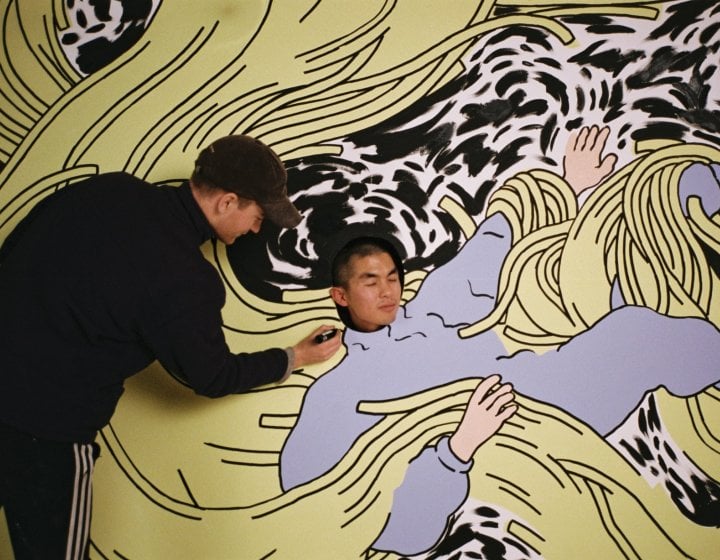
How Illustration graduate Calum Heath established a global freelance career
07 February 2024
With clients including financial magazine Barron’s, Danish newspaper Weekendavisen and style journ...
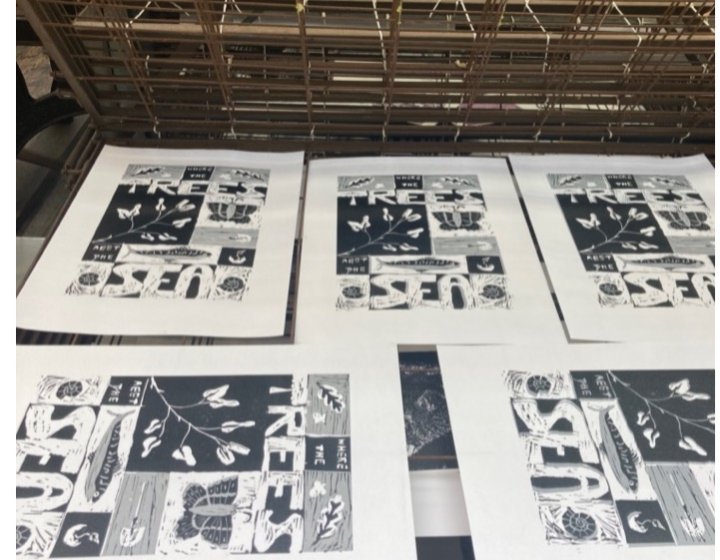
A week in the life of a Falmouth Illustration BA(Hons) student
23 January 2024
Tom shares what a typical week could look like as an Illustration student.
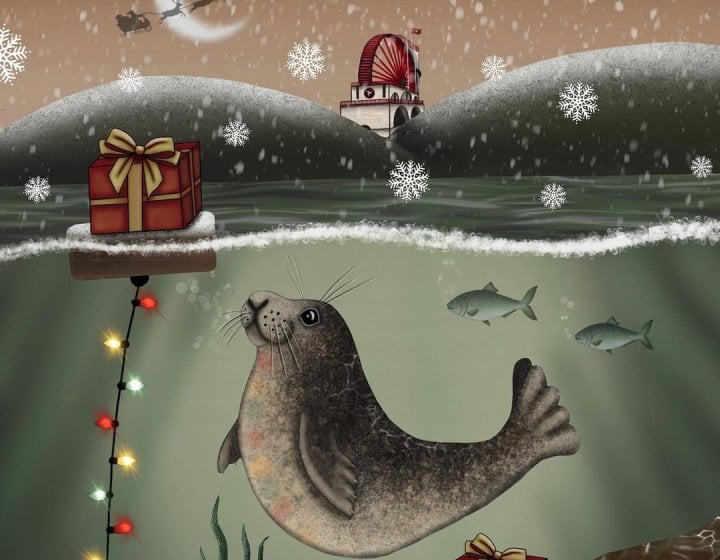
Illustration alumni and artist designs Christmas stamps for Isle of Man Post Office
04 December 2023
Rowan Corlett, an artist and BA(Hons) Illustration graduate, has designed and produced a series of C...
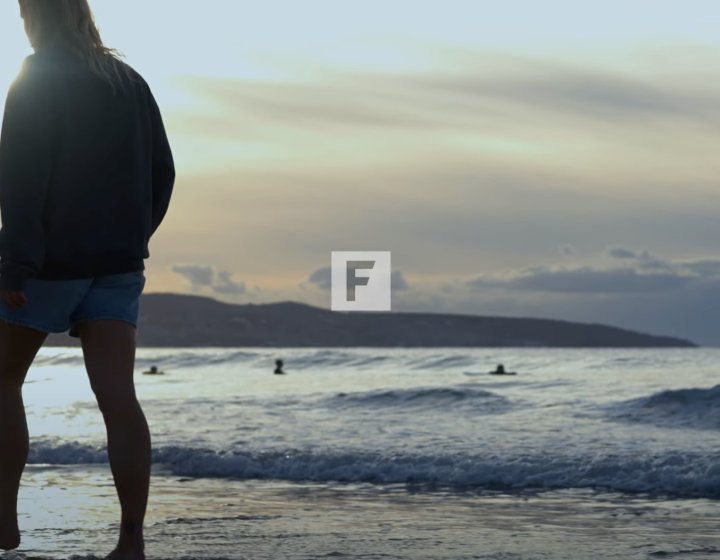
Ones to Watch | Abby Mundell
17 November 2023
Since graduating from our BA(Hons) Illustration Degree in 2022, Abby Mundell has gone on to create a...
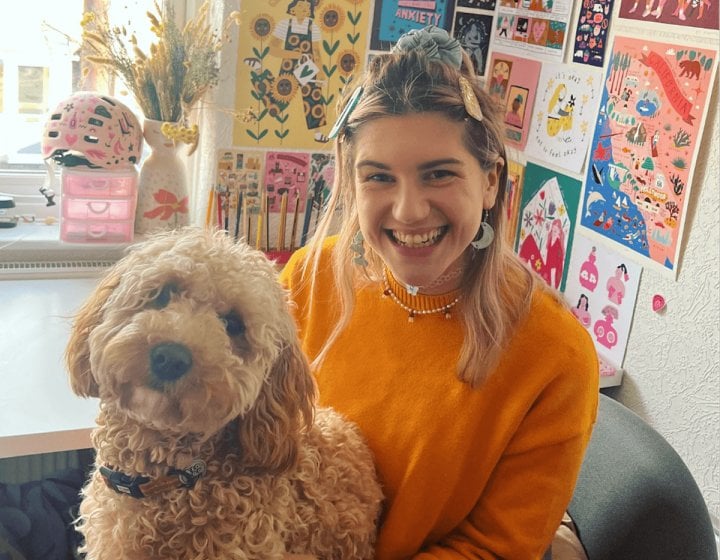
Meet Ella Kasperowicz, the creative spark behind this year’s graduation look!
18 July 2023
Illustration grad Ella Kasperowicz is the artist behind this year's graduation brochure.
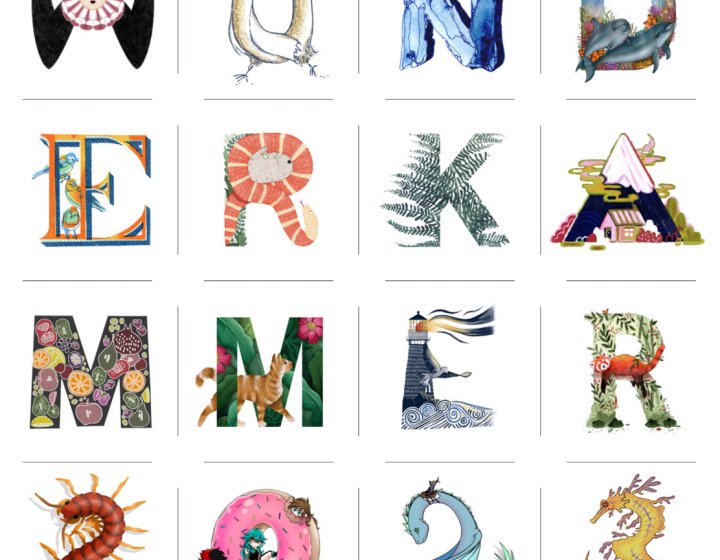
Explore our illustration talent with Wunderkammer!
12 May 2023
Want to see what our graduating illustrators are made off? Flip through the pages of Wunderkammer.
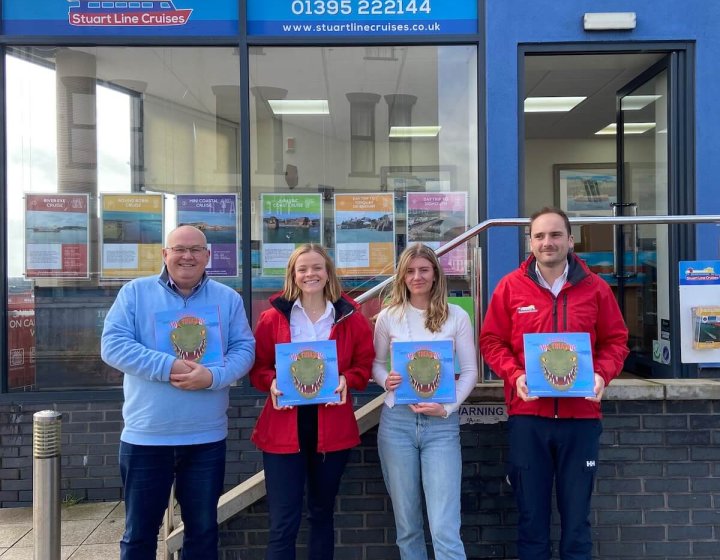
Falmouth graduate explores the natural world in illustrated children’s book
24 April 2023
Illustration graduate, Eleanor Western has published her debut children’s book, 'Welcome to the Tr...

Students create mural with Dave Draws for Red Bull Doodle Art
21 March 2023
Students joined forces with Red Bull and celebrated ‘doodling muralist’ Dave Draws to create a c...
Careers
Our Illustration graduates have worked as:
- Freelance illustrators working in editorial, advertising, publishing, fashion and narrative across a broad range of national and international clients, including the BBC, Google, The Royal Mail, The Guardian, Penguin, The New Yorker, Vodafone, Walker Books and The Wall Street Journal
- Designers, art directors and animators in companies such as the British Museum, Dorling Kindersley Publishing, Goodgame Studios, Nickelodeon, The Telegraph and Vault49 Design
- App and web designers
- Film and TV graphic designers
- Concept and character artists and visualisers
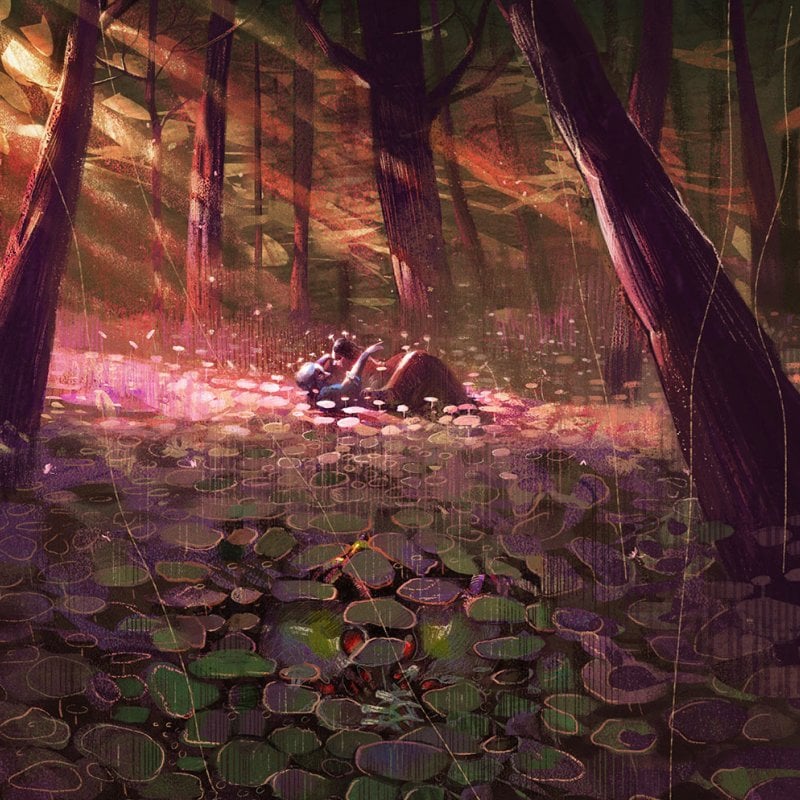
An Art or Design degree is an opportunity to channel your creative flair by exploring a range of media techniques to refine your practice.
How to apply
Ready to apply for 2025?
You can apply for our undergraduate degrees via UCAS. You'll need our university UCAS code (F33) as well as your course code (which you'll find on your course page) for your application.
| Course route | UCAS code |
|---|---|
| Illustration BA(Hons) three year degree | W221 |
| Illustration BA(Hons) with Integrated Foundation Year | FY12 |
| Illustration BA(Hons) with professional placement | PY20 |

Application advice & interview information
Go to ToolkitFor starting your studies in 2025
UK applications: 29 January 2025 (for equal consideration)
Applications after the 29 January will be considered on a first-come, first-served as long as there are places available. Apply for this course now.
International fee payers
International fee payers can apply throughout the year. But we recommend applying as early as possible, to make time for visa and travel arrangements.
We consider all applications on their own individual merit and potential. We invite all applicants to an interview day or audition to give them the opportunity to demonstrate this along with what inspires and motivates them in their field. Applicants will also be able to show their portfolio or give a performance depending on the course. We welcome applications from all subject backgrounds, whether you’ve specialised in STEM, the arts or humanities.
Course routes & entry requirements
BA/BSc(Hons) three year degree: 104 – 120 UCAS Tariff points
BA/BSc(Hons) four year degree with professional placement: 104 – 120 UCAS Tariff points
BA/BSc(Hons) four year degree with Integrated Foundation Year: 80 – 120 UCAS Tariff points
Check the title of your course to see if it's a BA or BSc award. UCAS Tariff points will primarily be from Level 3 qualifications such as but not limited to A-levels, T Levels, a BTEC/UAL Extended Diploma or a Foundation Diploma.
For applicants whose first language is English we require you to have or be working towards GCSE English Language Grade 4 (C), or equivalent.
If English is not your first language you will need to meet the same standard which is equivalent to the IELTS Academic 6.0 overall score, with at least 5.5 in Reading, Writing, Speaking and Listening. We accept a range of in country equivalencies and approved tests.
If you need a student visa to study in the UK, you may need to take a recognised language test. You can read our English Language Requirements for more information.
What we're looking for
We want someone who:
- Has visual problem-solving skills, with a specific focus on generating ideas.
- Shows development of visual language in drawing, life drawing, media, mark-making experimentation, reflective analysis and finished pieces.
- Has a good contextual understanding of what illustration is.
- Is confident in their abilities and prepared for the challenges of higher education.
- Can communicate effectively.
- Has a theoretical understanding of visual arts issues.
Fees, costs & funding
Tuition fees
| Annual tuition fee | Student |
|---|---|
| £9,250 per year | Full-time UK |
| £17,950 per year | Full-time EU/international |
| £1,850 per professional placement year | Full-time UK and EU/international |
| £9,250 per Integrated Foundation Year | Full-time UK |
| £17,950 per Integrated Foundation Year | Full-time EU/international |
| Annual tuition fee | Student |
|---|---|
| £9,535 per year | Full-time UK |
| £17,950 per year | Full-time EU/international |
| £1,905 per professional placement year | Full-time UK and EU/international |
| £9,535 per Integrated Foundation Year | Full-time UK |
| £17,950 per Integrated Foundation Year | Full-time EU/international |
Tuition fees for September 2026 will be confirmed in summer 2025.
Tuition fees are set annually and are subject to review each year. The University may therefore raise tuition fees in the second or subsequent years of a course, in line with inflation and/or the maximum permitted by law or Government policy. Students will be notified of any changes as soon as possible.
The figures above don't include accommodation and living costs
Typical course costs
- £250-£550 - Recurring annual costs (materials)
- £300 - Suggested reading
If you need to bring equipment or materials with you, these will be outlined in your Welcome Letter.
Additional typical course costs for Integrated Foundation Year pathway
- £250 for materials
- A laptop/desktop computer
- Adobe Creative Suite
To engage in the digital learning activity, although you will be able to access IT suites on campus, you will benefit from a laptop to access the platforms and tools we use. Depending on your subject, you may need a specific type of computer. If you're unsure about what you might need, please contact our course advisors.
Funding
For information about funding available, please visit our student funding pages.
Ask a student
What better way to find out about life at Falmouth University than by asking our current students?
From course details and academic support, to the social scene and settling in, our students are ready and available to answer any questions you might have. Simply set up your account, send them a question and they'll get back to you within 24 hours.
Similar courses
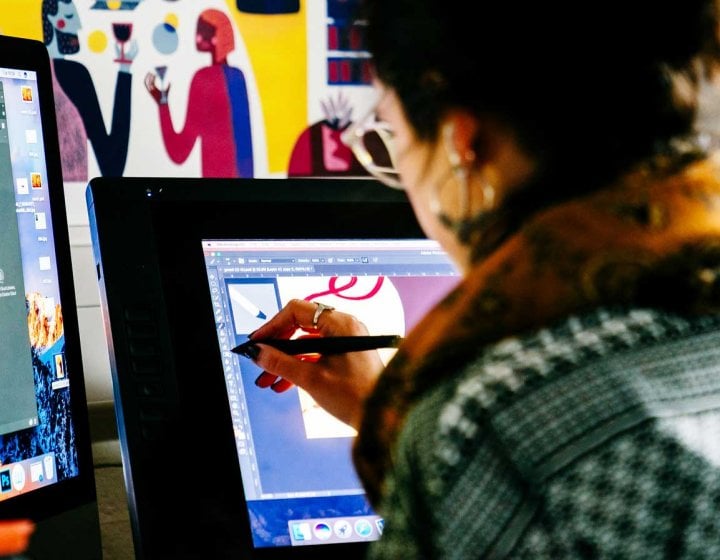
Visual Communication BA(Hons) (Online)
Get ahead in the vibrant, ever-evolving field of visual communications with this exciting online cou...
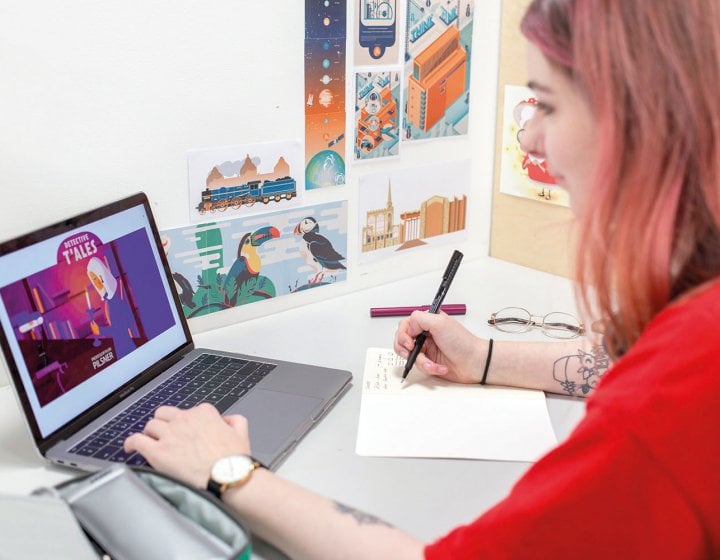
Illustration BA(Hons) (Online)
Gain the professional practice and entrepreneurial skills needed to turn your talent into a successf...
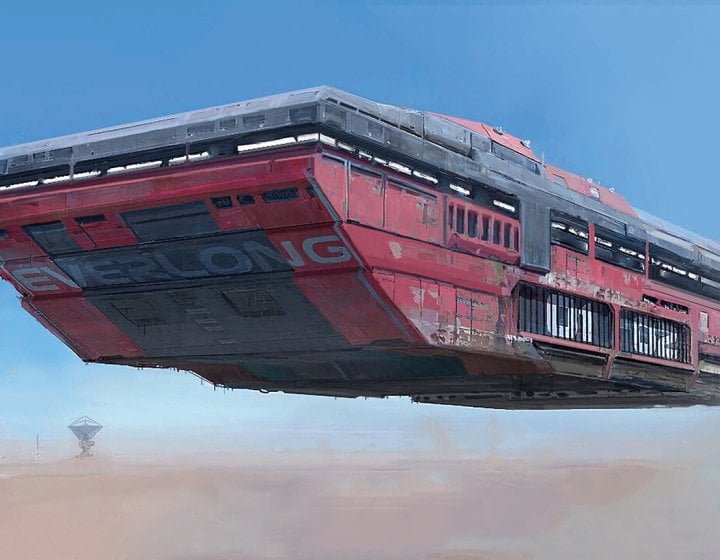
Game Art BA(Hons)
Work in multi-skilled collaborative teams and graduate as a confident, industry-ready game artist. ...
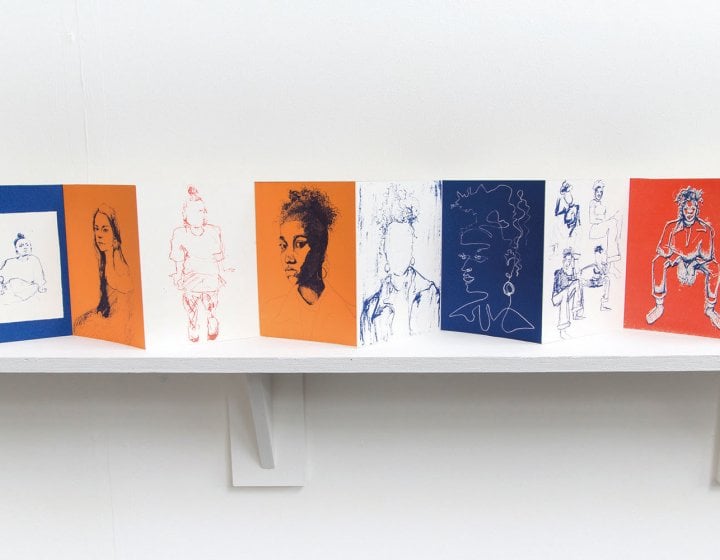
Drawing BA(Hons)
Become a rigorous and innovative critical thinker and practitioner. Build your skills, expertise and...
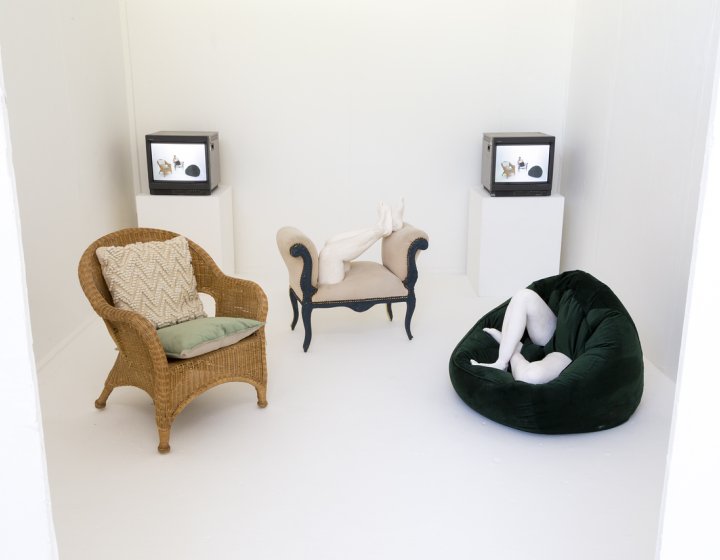
Student work by: Elinor Hain
Fine Art BA(Hons)
This highly-respected course aims to support the development of your practice as it evolves over the...
Open Days and events
From visiting campus to online application advice, get all the information you need about joining our creative community.
Find an event


